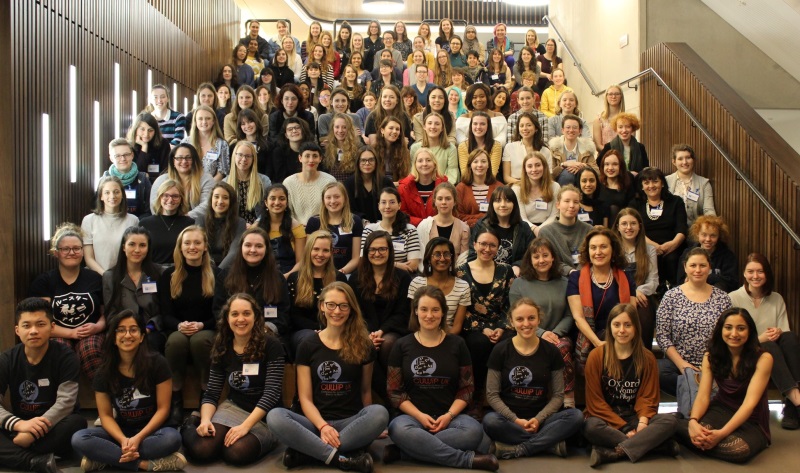The Conference for Undergraduate Women in Physics UK (CUWiP) aims to inspire physics students, highlight career options and provide a supportive community.
Students Sara Evers, Lucy Arditi and Storm Colloms (all year 2) attended the Conference, now in its fifth year, at the Department of Physics, Oxford University in March. Sara tells us what the conference entailed, and how she benefitted from attending…
The first full day of the conference started with a visit to national research facility, the Rutherford Appleton Laboratories (RAL). The most exciting part for me was the particle accelerator ISIS, the onsite muon and neutron source. The lab also hosts a central laser facility, a space research and engineering department and many other interesting facilities. As well as attending tours, presentations were made by several female engineers who told us about their work at RAL, how they got where they are today and about internship and graduate opportunities.
In the afternoon, we heard from Prof Alexandra Olaya-Castro from University College London about her research, inspiring career path and the challenges she faced along the way. Following that I attended a medical physics workshop. As someone who has always been interested in medicine and biology, being able to meet and talk to medical physicists and gain information about the different career options and training schemes was very insightful.
Day two started off with talks: Dr Francesca Day, who is a theoretical particle physicist at Cambridge University and a stand-up comedian gave a talk on ‘Science, Creativity and Stereotypes’, which focused on her personal story and research, and general gender and inequality issues in physics. Ms Carole Kenrick, a resident scientist working in primary schools in London, talked about getting young children invested and interested in science.
Tours of the laboratories at Oxford University were conducted in the afternoon, and I got to see a particle physics lab, where they worked on detectors for ATLAS, the particle accelerator and detector in Switzerland. I also saw a group working on producing solar cells out of biomaterials and some groups working on telescopes in the Astronomy department.
Following this was another talk: Dr Rain Irshad shared information on her career in space science, starting with her aim to become an astronaut, the many setbacks and changes in her life, and how she ended up working at RAL Space. I then attended a career panel, with six physicists who are now pursuing careers outside physics (e.g. Patent law, data science, government adviser). This showcased the many opportunities you can have with a physics degree. The day ended with an informal chat with scientists and PhD students.
The conference ended with an academic panel, and a talk from Dr Suchitra Sebastian about combining a career in physics with a life outside of work.
Attending this conference benefitted me in many different ways. I realised there are many different career options available to those with a degree in physics, and learned how one can get into these different areas. It was very motivating to hear about all the setbacks people had to overcome, despite making it to where they are today. I now have a better understanding of what it means to do physics research both in academia and industry and what alternatives there are. On a more practical level, I learned about several internship programmes, some of which I will apply for next year, as well as information on postgraduate studies and funding, which will be very helpful in a few years’ time.
The most inspiring aspect of the conference however wasn’t the great programme, but that I got to meet so many female physicists and physics students, all very passionate about this subject. Being used to usually having a male majority in every lecture and workshop, sitting in a lecture theatre full of female physicists is quite an empowering feeling. Over the weekend, I got to meet so many great and inspiring people and made many great connections and friendships that will hopefully last for a long time. I’m very grateful to both the organisers of the conference, especially the main organiser Prof Daniela Bortoletto, and the School of Physics and Astronomy at the University of Edinburgh, who enabled us to attend the conference by covering our travel costs to Oxford.
CUWiP:
https://www.physics.ox.ac.uk/confs/cuwip2019/aboutus.html
(Conference Attendees. Photo credit: Kathryn Boast, University of Oxford for CUWiP UK 2019)




If you’d like to find out more about medical physics, space careers, patent work, data science and more, please follow my careers blog for UoE physics and astronomy students at :
https://edinburghphysicscareers.wordpress.com/
and our careers information pages at
https://www.ed.ac.uk/careers/occupations